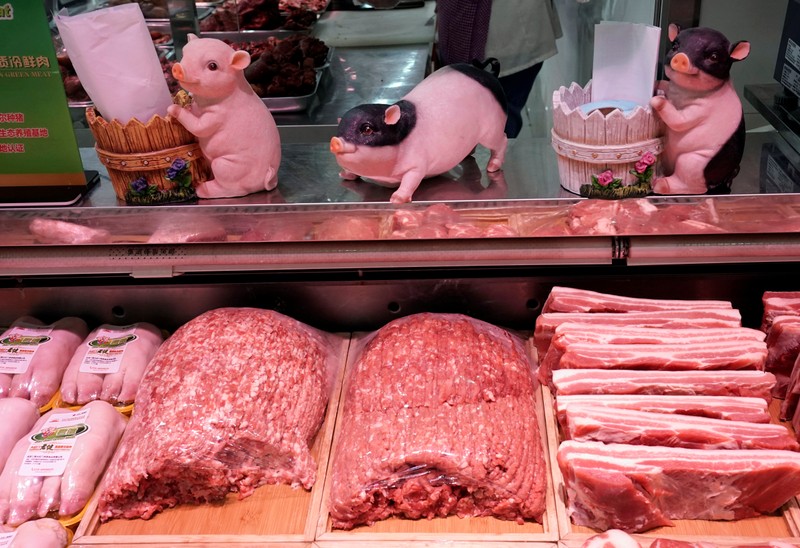
FILE PHOTO – Pork for sale is seen at a supermarket in Beijing, China, April 11, 2019. REUTERS/Jason Lee
August 9, 2019
BEIJING (Reuters) – China’s factory gate prices shrank for the first time in three years in July, stoking deflation worries and putting pressure on Beijing to deliver more stimulus as the economy sputters amid an intensifying trade war with the United States.
With demand slowing at home and abroad, Chinese manufacturers are having to cut prices to keep market share, depressing profit margins and discouraging fresh investment needed to get the economy back on its feet.
Falling prices for crude oil, iron ore and other raw materials are also playing a part.
China’s producer price index (PPI) fell 0.3% from year earlier in July, the National Bureau of Statistics (NBS) said on Friday.
That compared with zero growth seen in June and a 0.1% drop expected by analysts in a Reuters poll.
It was the first contraction on an annual basis since August 2016, though the index have now dropped sequentially for the last two months.
“Weak demand has started to impact expectations on the production side,” analyst Zou Qiang at Everbright Pramerica Fund Management said in a note.
Zou expects the price contraction to worsen in the coming months due to stricter curbs on the property sector, as regulators try to rein in debt risks.
Producer inflation in other major economies such as the United States and Germany has also been tepid lately, raising questions about the durability of global demand as the year-long U.S.-China trade war looks set to get longer and costlier.
The Chinese industries which saw the steepest factory price declines included oil and gas extraction, and paper and paper product manufacturing, with falls of 8.3% and 7.1% from a year earlier, respectively.
Energy processing firms such as oil refiners and chemical producers also saw extended price declines.
Prices for some major building materials such as steel reinforcing bars were weak in July as high temperatures and rain stalled construction projects.
CONSUMER INFLATION PICKS UP
Friday’s data also showed China’s consumer inflation picked up to a 17-month high in July, mainly driven by a jump in prices of pork and other proteins due to a prolonged outbreak of African swine fever, and dry weather in fruit-growing regions.
The consumer price index (CPI) rose 2.8% from a year earlier, a touch higher than expectations and June.
Food inflation accelerated at the fastest pace since January 2012. The food price index rose 9.1% on year, picking up from a 8.3% uptick in June. Fruit prices surged 39.1% and pork prices jumped 18.2%.
On a month-on-month basis, CPI grew 0.4% in July after dipping 0.1% in June.
Core consumer inflation — excluding food and fuel — remained modest, however, easing marginally to 1.3% on-year.
(Reporting by Yawen Chen and Ryan Woo; Additional reporting by Roxanne Liu; Editing by Kim Coghill)

